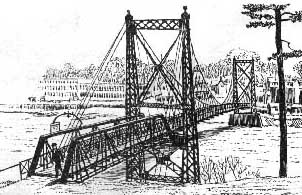 |
Kotlas - Waterville Area Sister City Connection P.O. Box 1747 Waterville, ME 04903-1747 Write to Us |
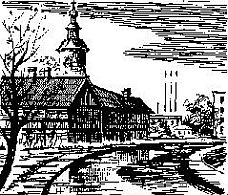 |
![[Show table of contents & options]](../../questionsign.gif)
 |
Kotlas - Waterville Area Sister City Connection P.O. Box 1747 Waterville, ME 04903-1747 Write to Us |
 |
|
Home > Impressions > Winter 2008 |
![[Show table of contents & options]](../../questionsign.gif) |
If you are viewing this newsletter without the table of contents, click the question mark sign anywhere that it appears to display the table of contents and other options. |
In January, our own Dr. Ken Green went to Kotlas to volunteer to teach a course in Conversational English. Below are his reflections on his trip.
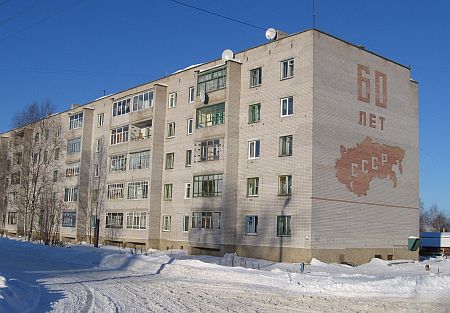 Ken Green lived on the fifth floor of this apartment building. The red bricks on the side spell out "60 Years USSR," which implies that the building was constructed in 1987, the sixtieth anniversary of the founding of the Soviet Union. |
Last fall the Connection received a request from Kotlas to help start an English language school. Since I had some experience with this I volunteered to go in January, 2008, for one month. Most tourists go to Russia in summer, of course, but if one wants to meet people, then winter will do quite well, also. It was the usual flight to Moscow. I tried Aeroflot for the first time and was pleasantly surprised. From Moscow I took the train, as there are no flights to Kotlas, only Archangel. I enjoy train travel, and this was no exception. I did sleep a lot to make up for the night on the plane. We traveled all night and all day, although it was a short day. In mid-winter at that latitude the days are short, perhaps six hours, so it was dark when I arrived. My host took me directly to an apartment where we had tea and a bite to eat, and then he left.
The apartment was typical Russian suburbia — small, but with all necessities, plus satellite TV and Internet. Heating is unusual by US norms as there are no thermostats. It really is "central" because the temperature of the heating water is controlled at the central furnace somewhere downtown or out-of-town. It is like Putin's residence — no one knows where it is. It doesn't matter because one simply opens or closes the window to control the temperature. Most people wash dishes under running hot water, and teenagers can stand in the shower for an hour. They are not short on energy.
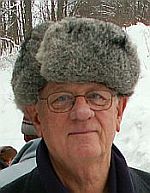 Ken Green |
The school was within walking distance, although I rarely walked. It was very cold that first week, about -35°F, so I went by car. Later it warmed up somewhat. The old timers say it used to be colder, and school was cancelled on cold days when they were kids, but now with global warming it's not so cold in winter. Most Russians are not bothered by global warming. We have more snow in Maine. It seems that everyone wants bragging rights as to who has the most, and I realize that this year was a record 10 feet for Maine, but even at half that it would still be more than Kotlas. It's just too cold for heavy snow, and they are a long way from water to pick up any moisture. The White Sea is frozen over.
Classes started soon after I arrived. They were for school children who wanted (or rather whose parents wanted) extra lessons, and also for young adults. The times were between 3 p.m. and 9 p.m. That's a little late, but they are just feeling their way as to how volunteers would like to arrange their time.
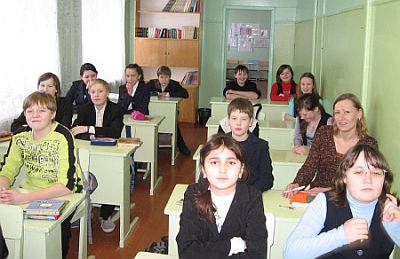 Here is a class that Ken visited at Lyceum #3, the same building where he taught. The teacher, in the second row on the far right, is a member of the Waterville Committee. Click the photo to enlarge it. A picture of the Waterville Commitee appears below. |
The school building was probably from the 1960's, but warm and with good lighting. The only problem with Russian schools is the wooden floors instead of carpeting. The patter of little feet is more like the roar of a locomotive when it's break time — especially if the kids decide to chase a ball in the corridor. The kids were great: handsome boys and pretty girls, clean, well dressed, and polite. I don't know what the dress code is. They do not have uniforms, but many of the boys wore suits or dress shirts, tie, and jacket. It's harder to describe the girls — ladylike or modest is too old-fashioned, but they have no bare midriff showing. Looking ragged is not fashionable in Russia. I mentioned polite; when a teacher entered the room they all stood up. If they wanted to talk, they raised their hands. Their general knowledge was rather good. It's seldom mentioned that the Communists were rather puritanical, and traces still remain in the schools.
Russian hospitality is legendary, and this trip was no exception. The night I arrived was the Russian New Year, and I was invited to the Mayor's party. He invited me several times on different occasions, as did others whom I had met when they visited Waterville. When they found I enjoyed their sauna, I was invited to that, too. It's not just a steam bath, its food and drink and conversation and no formality. That's not possible when one is naked. I was there for a month. It was a good month. Nice people.
| Editor's Note: Readers may be aware of Volunteer Kotlas, a program advertised on various websites that solicits volunteers to teach English in Kotlas. This program is affiliated with Language Link, a British corporation for language teaching. It has not been endorsed by either the Kotlas Connection or the Waterville Committee. |
![[Show table of contents & options]](../../questionsign.gif) |
Dispatches from Kotlas |
During his month in Kotlas, Ken Green wrote a series of emails to friends and family describing his exploits in detail. Below are some excerpts edited into a single narrative.
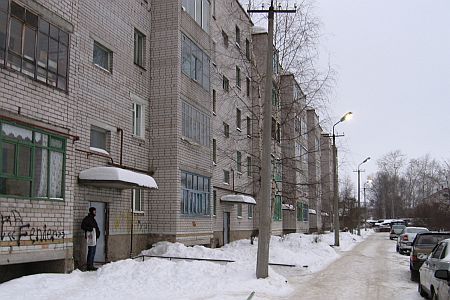 The rear of Ken's apartment building. In the lower right is a spray-painted graffito. Ken notes that graffiti are rare in Kotlas. |
Finally I can write.
We have Internet in the school and it has been working all along but I never have time when I am there. This is sent from my apartment. The plan all along was to get Satellite TV and Satellite Internet in the apartment but when I arrived it was too cold to install it. They had to wait almost a week for the temperature to get above -20°C.
The TV has about 1300 channels. Friday night I spent flipping through them looking for something useful, I found about a dozen. The rest are either not purchased or in some weird language. Most common useless channel seems to be those advertising phone sex in Arabic.
When I arrived in Moscow I breezed through Customs and Immigration, Dima said "Of course" as my invitation was from the "Russian Olympic Committee". (Dima is the founder of the school and the one who invited Ken Green to come.) He and a friend met me at the airport (SVO) and drove me around for some sightseeing, after that to a Ukrainian restaurant.
The food was good. Then to the train station, we waited about 20 minutes and then boarded.
It was cold outside and everything was not only snow covered, but frost covered. The snow was very fine powder and dry but the frost was more impressive as it was not just on top of things but on all sides and even underneath.
We passed through quite a few villages but not many people were out and it was the same when we arrived here in Kotlas, everyone was inside. Dima said it was unusually cold even for up here. The train was good, I slept most of the time, Dima had brought food.
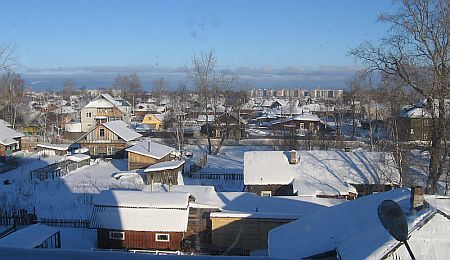 The view from the balcony of Ken's apartment. Click the photo to enlarge it. |
When we arrived we did not get out on the station but on the other side of the train and walked across the tracks to a waiting car. I never saw the station. The car was a new red Volvo driven by Natasha who is Dima's business partner. I don't think Dima has a car.
My apartment is a typical Russian bed-sitter, (i.e., with a combined bedroom and sitting (living) room). It has one good size room with a bed, sofa, TV, table, etc. There is a balcony outside, but it is not used in winter. There is also an entry hall, kitchen and bathroom.
It's on the fifth floor and, according to tradition, buildings of five floors or less do not need elevators, so I do get some exercise.
I don't buy any food, Dima provides it all, he won't let me spend a penny and in fact I have not used any money since I left JFK airport.
The first few days were national holidays so the school was closed to children but Dima has a room in the school and his own key so his classes have been held all along.
![[Show table of contents & options]](../../questionsign.gif) |
A Visit to Solvychegodsk |
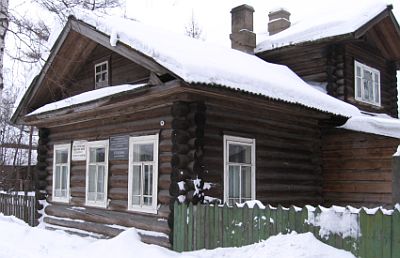 Stalin's home in exile in Solvychegodsk, whither he was banished in 1911. |
It's been busy the last two days. On Friday morning (January 18) we drove about 20 miles to the town [Solvychegodsk] where Stalin lived in exile.
His house stands intact, a log cabin built 100 years ago. The timbers are original; the walls I touched are the same walls that Stalin touched. The wood fireplace and stove is the same, and the house is heated by the original stove. The toilet is outside and there is a well for water. There were no other tourists there that day — perhaps more come in summer — there was a guide. Half the house was occupied by another family, which explains why there was a baby crib suspended from the ceiling about 4 feet above the floor, out of the drafts.
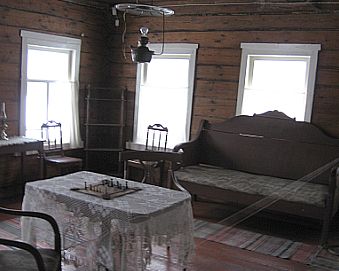 Inside Stalin's house, which is now a museum. |
Actually there are many such houses in this area, the well known high rise apartment buildings from the Soviet times are only in the cities, in all the villages single family homes are the norm and almost all are log cabins. They are heated with wood. There are some that look older than 100 years.
On the way back we stopped at a church. It was 500 years old and in good condition. We climbed the bell tower, which was extremely high and functioned really as a watchtower. I pity the guy on watch, it was windy that day and of course no heat up there.
The church, or monastery, was massively constructed with heavy doors reinforced with steel. In the cellars were hiding places for both people and treasured icons. There was never heat in the church although now there is one room where the icons are kept which is warm. I think this is for preservation reasons rather than human comfort.
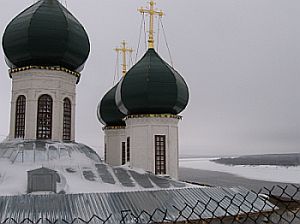 The view from the bell tower. The Vychegda River is in the background. |
The walls in the main room were covered with murals depicting Bible scenes. Of course, in those days, none of the peasants could read so their education was the pictures. Most prominent was judgment day showing a huge balance where people were being weighed. On the right, those that were found wanting were sent straight to Hell, and pictures showed them naked and being eaten by horrible beasts and other grisly fates. To the left were those who were saved, standing around in nice clean clothes.
There were no souvenirs for sale and we had to pay admission. I don't know how much, Dima pays for everything.
In the afternoon we had class as usual till 9:00. After class Dima told me the Mayor (i.e., the mayor of Kotlas, Sergey Melentev) had called and would pick us up at ten the next morning and take us to Church.
A view of the Annunciation Cathedral, the church that Ken visited, from across the partially frozen Vychegda River. The superstructure is shrouded in scaffolding for restoration of the exterior. Click the photo to see a closeup of the church.
![[Show table of contents & options]](../../questionsign.gif) |
Epiphany in a Country Church |
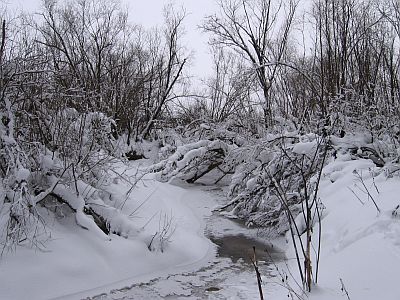 Snow-laden bushes and saplings bend over a frozen stream. Further down, the faithful were immersing themselves through a hole cut in the ice. The waters of this stream are believed to be blessed on Epiphany. |
Usually called the Feast of Theophany (Greek: "God shining forth" or "divine manifestation"), it is one of the Great Feasts of the liturgical year, being third in rank, behind only Pascha (Easter) and Pentecost in importance. Orthodox Christians celebrate Epiphany on January 6. (The date of January 6 on the Julian Calendar used by most Orthodox Christians falls on January 19 of the modern Gregorian Calendar).
The mayor picked us up around 10:00 and we drove some 15 miles out in the country, I think we were heading west but it was a cloudy day so hard to tell, at any rate we crossed the river [the Northern Dvina] by the new bridge.
After taking a few back roads, we came to a small village where the mayor, Sergey, had built a new dacha and sauna. It was not quite finished but it was a very professional job. If he is not re-elected, he could always get a job as a carpenter.
After the dacha visit, we drove back to the main road and then stopped at another side road. We would have driven further but the road was blocked with cars everywhere. Normally a two-lane road it was now impassable, since one lane had parked cars and the other had cars trying to get out meeting those trying to get in. We walked. It was less than a mile to the church and the road took us through a beautiful forest of tall pine trees. On the right was a cemetery but it was forest all the same, the hand of man had not disturbed nature.
 The cemetery in a pine forest. Russians do not clear land for cemeteries, but generally set the graves amid the trees. |
We passed the parking lot, it was full and saw many people returning, most carrying bottles or jugs filled with water. It was dawning on me that this visit was related to baptism by immersion and that since it was January 19, the annual ritual should take place on that day, in this particular river on whose banks the church was built. On this day the water was holy and could be saved for future use in case of illness.
We finally came to the church but bypassed it and proceeded to the river but first we had to go down the bank about 75 feet down. Not easy, a primitive path, no steps and slippery. We came to a group of people, about 50, some coming and some leaving. On the rivers edge some were getting dressed and some undressed, Sergey, the mayor proceeded to get undressed, not naked, they kept boxer shorts and the women kept their underwear. A hole had been cut in the ice about 6 feet square and each person, one at a time jumped in and ducked totally underwater. He/she then stood — the water being about 3 feet deep — and crossed themselves. This was repeated three times after which they got out with difficulty because the snow around the hole was wet and icy. They got dressed and then went upriver about 20 feet to fill their containers with the holy water.
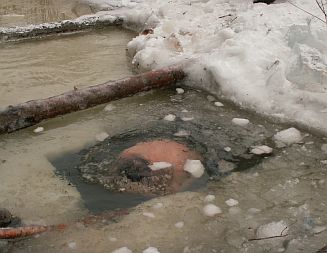 A man immerses himself in the holy water. Roll your mouse over the picture to see him come up. |
This year had good weather, about -4°, but often it is much colder.
Of course I was the only foreigner present, but they were cool with that. They were taking pictures so I did too. Some girl came up and asked what I thought of the proceedings. Her friend had a movie camera and she had a microphone. Dima said it was the local TV.
After the mayor, Sergey, got dressed we climbed back up the riverbank and walked back to the car.
After lunch we had classes in the school. Class should have gone till 9:00, but at about 6:00, Dima got a phone call from the mayor inviting us to go to the banya (sauna) that same evening. Despite our prior commitment, Dima accepted. I think he has a great respect for the mayor and would not dare to say no. Classes were cancelled.
![[Show table of contents & options]](../../questionsign.gif) |
Naked with the Mayor |
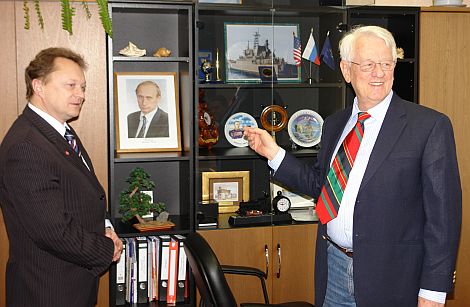 While we don't have any pictures of Ken and the mayor in the banya, here is one taken at a dressier meeting in the mayor's office. Note the framed photograph of Vladimir Putin next to Mayor Melentev (left). |
Sergey, the mayor, picked us up from the school in his SUV. This is one place where an SUV is the logical vehicle. One needs not just 4-wheel drive but also the high ground clearance. We drove only a couple of miles and stopped at a private house.
We did not go in the house but proceeded directly to the banya (sauna) out back. It consisted of three small rooms. The first had a table and chairs and the table had beer, vodka and food in abundance. The main dish was from some kind of Arab restaurant and was mostly different kinds of meat and sausage but also some fish. But that was for later, first the sauna.
The second room was for changing and had shelves and hooks for the clothes. I was given some kind of wrap to go round my waist but I know better than that. One is supposed to be naked in a banya. The wrap is for later when eating.
So we go into the third room. It's damn hot, but I don't know how hot since my glasses had fogged up and I took them off.
 Ken never did get to take that ride in a MiG, but he was able to try on MiG pilot's helmet during the aforementioned meeting in the mayor's office. |
Over the next hour we go in and out a couple of times, staying till we are really sweaty and then going out to cool off. We cool off outside and not just standing outside but jumping in the snow and lying flat. But not for long.
Back inside its time for male bonding, we sat around the table and started drinking eating toasting and telling stories. There were five of us, four half-naked and Dima, who translated but did not join in the sauna part. I don't remember the names of the other two guys. They were both really nice, one was a retired pilot (civil) and the other a retired military general who now runs the 911 service for Kotlas.
After talking about hunting, Sergey asked if I would like to fire an AK-47 or a sniper rifle. You bet I would! He also promised I could sit in the cockpit of a MiG fighter. These people are very hospitable. Today it's about -6° Celsius, but windy, so it's quite nasty outside.
I have been to the supermarket and bought some food and a bottle of vodka. I am told vodka is good for the health, so I bought a large bottle.
![[Show table of contents & options]](../../questionsign.gif) |
The Firing Range |
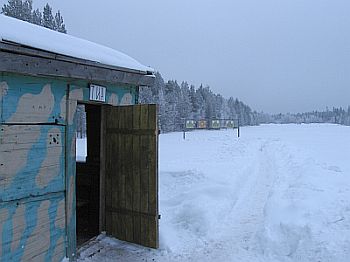 A shooter's shack and the targets (dead center). |
Sergey, the mayor, picked us up at about 1 p.m. with his SUV and driver. We headed east for about half an hour. It was a cloudy day, but not cold, -10°C, and with no wind. Typical northern Europe winter day.
We turned down a side road and drove a few more kilometers to a small village on the other side of which there was the railroad. It widened out to about six sets of tracks but only two were free of snow. We drove about 300 meters more; the road ended; and we were deep in the woods.
Several SUV's were already parked, and we were met by four uniformed men. I noticed three stars on the shoulder of one. He was not smiling. I wondered if I was really welcome. I found out later that no foreigner had ever visited this place before. I was the first.
We walked to the railway and crossed over the tracks, signal lights were red from both directions and no train in sight. The path led or rather wove through the woods, it was not really a path but others had walked this way before and packed down the snow. After several hundred meters a sign and another hundred meters another sign, either "Keep Out" or "Firing Range" — I was concentrating on where to put my feet not translating signs.
Through a fence and we entered a clearing about twice the width of a power line in Maine and about 500 meters long. There was a log cabin with four windows on one side facing the targets about 25 meters away. This close range was for pistols. To its side was the rifle range with targets at 100 meters.
Behind the cabin was a picnic table. Bags opened, food and vodka appeared. Now everyone was smiling and happy. It seemed this event was not being staged for me; I was merely tagging along to a social event that they do about 3 or 4 times a year. Two were high-ranking officers, one a lieutenant general and also the chief of police for the district. Two other army officers were already there; I think they were firing instructors.
Inside the cabin was a table with many weapons laid out — a Russian smorgasbord. "What would you like to fire," I was asked? "All of them," I replied.
So we started with the pistols and automatic pistols, about half a dozen. After each gun I went out to the target so see how I did. Sometimes well, but not consistently so.
Next to the distance range where there were already old blankets thrown over the snow at each firing spot. First the AK-47, the legendary AK-47, and I am being shown how to shoot it by a Russian military marksman — how cool is that!
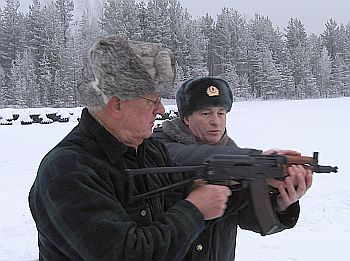 Ken is shown how to hold an AK-47. |
The "A" in AK-47 stands for avtomat, or automatic. The "K" is for the surname of Mikhail Kalashnikov. "47" is the year it was finally produced. It began, however, during the Second Word War in response to a request by the army for a design of a new rifle. There was a competition, and this was the winning design. Kalashnikov was later criticized for inventing a weapon that has killed so many people. He feels this is entirely unfair, as it was designed to defend Russia at a time it was under attack. He never received a dime in royalties, although he did make general. Soldiers in the field prefer it to the U.S. rifle because it never jams.
First, I fired the original AK-47, both single shot and bursts. It's hard to fire short bursts, as it's so fast. My score here was bad.
Next, I fired a modified version. It has the same basic mechanism, but with a shorter barrel and folding stock. To my surprise I did much better: 8 hits from 10 shots; I was pretty happy with that. They asked if I would like to save the target, so it's now a trophy folded in my bag.
We now all assembled at the picnic table and drank a toast with the vodka. I don't remember what all the toasts were; one was to friendship. I noticed three or four empty bottles before we left. There were about ten of us but I only had four shots. After all, we had classes later so I had to set a limit. Actually they always eat as they drink so on a full stomach the absorption is slowed; the real effect comes later. We ate sausage and it was excellent.
The three-star general was now all smiles as was everyone else. Lots of photos were taken either with me or of each guy holding a gun and looking ferocious. Despite all the stars on the shoulders, it was still boys with toys, and we had a lot of fun.
As the vodka ran out and the sausage was gone, the grey sky began to fade and it was time to leave. The lieutenant collected the guns; he had five slung over each shoulder and we followed him back to the path through the woods. Back at the parked vehicles the path was no longer visible, swallowed up by a thousand miles of forest. With warm handshakes from the brass, we were off.
![[Show table of contents & options]](../../questionsign.gif) |
A Taxi Tour of Kotlas |
 Vanya and his taxi. |
Thursday (January 24) I finally drove around the town on a guided tour. Tanya's husband has a taxi so she was happy to take me. (Tanya Shelygina and her husband, Vanya Shelygin, visited Waterville in March 2006.) It took about an hour; it's not a small town.
On the outskirts is the shipyard, which is a lot bigger than I thought. At present there are many, dozens, of boats stuck in the ice, waiting for spring.
We pulled over to take a photo and the car was then stuck in the snow. Tanya was quite unperturbed; she and I simply walked away from the car. She, like most Russian women, thinks cars are totally uninteresting. Her husband simply flagged down the first passing car, took a rope from the trunk, and had the car pulled out, all in ten minutes.
We then visited the electric company where Tanya's sister works. It's the main power distribution for a 200 km radius. Power comes in at 110,000 volts from Archangel and is then distributed around the area at lower voltages. I was shown the main switching room but was careful to keep my hands in my pockets.
The chief engineer gave us the guided tour. He complained that the gear was very old, but since transformers have no moving parts, I guess it will keep working for quite a while longer. At the end I was given a souvenir, an orange hardhat!
![[Show table of contents & options]](../../questionsign.gif) |
A Medical Caravan |
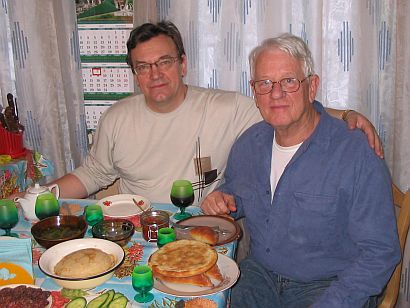 Ken Green visits Alexander Menshakov (right) in the latter's home in Kotlas. |
On Saturday evening (February 2), Alex picked me up at 8 p.m. (Alex is Alexander Menshakov, the director of a private clinic in Kotlas who was a member of the medical delegation that came to Waterville in September 2006.) I was at the school from 3:00. Classes normally go till 9:00, but Alex and I agreed that 9:00 is too late on Saturday, especially if there is something better to do.
Actually Alex was out of town and he sent his car and driver. I know that driver now, having met him several times. He does not speak English, but we get along. He is a real nice guy and an expert hunter.
Soon after we passed the outskirts of town he pulled over and asked if I wanted a shot of vodka. "Why not," I thought, "We have a two-hour drive, and it's Saturday night." Anyhow this night the driving was tricky, light snow falling and very dark so the driver did not drink anything, just me.
We soon pulled off into a smaller road and for the next hour we passed only one vehicle, a snowplow, and after we passed the plow, the road was half covered with blowing snow and drifts. This road, like many in Russia, was at its best in winter. In the mud season, it could be closed for weeks, so in towns supplied by it, the villagers would stock up in advance. But even at its best it is not salted or sanded. It takes skill to drive fast.
We pulled into the town at about 10 p.m. and came to a well lit, one story building that I presumed was a hotel. Alex had said something about staying in a hotel. It was not a hotel, but the local hospital, which had been taken over for the weekend by Alex and his band of traveling doctors. There are about 12 of them, all specialists in a different field, some moonlighting from the Kotlas hospital and some permanently working either with or for Alex in his private clinic.
I asked how many doctors there were in the town when this group goes away. The answer: "One." I met most of his troop that night. Alex had food and, of course, multiple toasts. Some of them wanted to sing; others took photos; some ate. All wanted to relax. It had been a long day. Among them, they had seen 950 patients; the next day they saw another 500.They were a very happy group. Alex is the boss, no doubt. He started the whole process, but they all love him, and without his organization, the town would have no medical care, and the doctors would have only the state pay, which is very little. They travel by bus, their own bus, packed with doctors, nurses, mobile medical equipment, and laughter.
After half an hour of socializing, Alex's driver would take me and his son-in-law, Dima, (not the same Dima who founded the language school) to the hotel. As we walked out the front door Dima said to watch out, it was slippery. Some woman had arrived bleeding from a open fracture and the blood made the steps slippery. The hotel was simple but clean and warm. It had two beds, a shower and toilet. Dima and I shared the room, I get along well with him and we talked for about an hour. I slept well.
![[Show table of contents & options]](../../questionsign.gif) |
Hunting Camp |
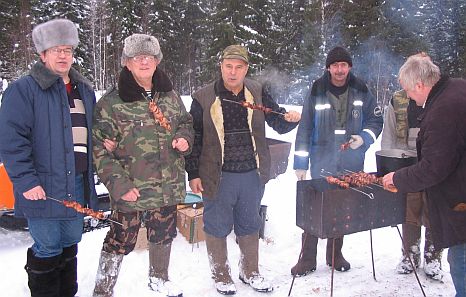 Alexander Menshakov and Ken Green (first and second from the left) prepare to enjoy shashliki, skewered chunks of meat cooked over an open flame, with other members of the hunting party. |
At 8:00 the next morning, Alex arrived with breakfast. There were no restaurants in this town. He had a friend with him who was the owner of the hotel and in fact had renovated the building. It had been some government owned place, a health care facility or an old folks home.
His friend German (Herman, but Russians pronounce the "H" as a "G," as in Adolf Gitler and Gary Potter) was a businessman and an avid hunter. He brought some clothes for me. I had winter clothes but his were much warmer. At one stage he asked me how old I thought he was. I took a careful and close look at him and said 48. He was in fact 64.
We drove out of town for some miles alongside a power line. At least I assumed that's what it was, but found out later it was a gas pipeline supplying a large part of Eastern Europe.
After 20 minutes we pulled over where three snowmobiles were waiting. One was towing a large sled. Five minutes later we were driving along a trail in the woods. It was a bumpy ride and probably more so for the two guys in the sled. I had to hang on tight; one guy fell off on the way back.
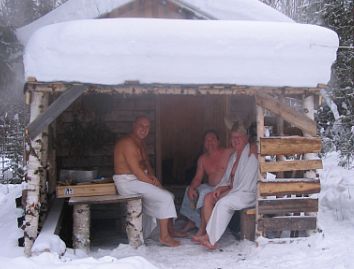 Ken Green (right) and two other members of the hunting party cool off after steaming themselves in the banya. |
Miles from anywhere we came to the cabin where two guys were already cooking on a barbeque. There was a sauna close by. I had a choice of sauna, sleeping, or going through the woods on skis to look for some animal to shoot. I picked the sauna.
After the sauna they had lunch with a lot of food and vodka. I drank very little but one guy drank a large glass just like it was water and he kept drinking. Later he played a good game of chess. I played too but badly; it's been a long time since I played.
One guy was singing. Then they all wanted to sing, out came a bag with wigs and masks, girls hair, spider man, and so on. The big guy with the big thirst played the accordion. They asked what I did at night, and I said, "Watch TV." It seemed pretty tame.
Later we did some shooting. They had a dead duck strung up in a tree as a target. I was happy with four hits from six shots. I got the impression that they don't hunt for sport, that they eat all they shoot. Rural Russians are poor.
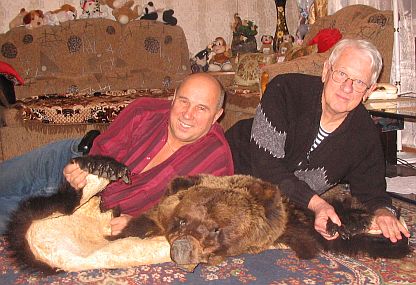 Ken luxuriates on a bearskin rug in the hunting cabin. |
We returned to the hotel, got changed, and met Alex at the hospital. All his clan was gathered at the bus. Alex made a couple of toasts and then we were off. It was dark now.
An hour later the bus, which we had been following, pulled over. Some got out for a smoke or toilet, it was pitch black. Alex hustled me into the bus and there was all the meat that had been on the barbeque. And bread. And vodka. And Alex conducting the orchestra, telling everyone to eat and proposing toasts.
He preferred not to use an interpreter when I was there. He spoke German but he got carried away and addressed everyone in German. No one understood him, but he kept talking anyhow. I translated to his son-in-law who in turn told all the others in Russian. That bus was as much a traveling circus as a mobile hospital.
We were home by about 9 pm. I went to bed. It had been a busy 24 hours.
![[Show table of contents & options]](../../questionsign.gif) |
Departure |
Today (February 5) I am packing. This afternoon I have a talk at the college at 1:30 and after that, classes at 4:00. Tonight I will have supper with Alex and family. I leave tomorrow. Train to Moscow arrives the next morning. Flight from SVO (the Moscow airport) leaves at 4 p.m. People are giving me things; I can't bring them all. Some students asked, "Why are you leaving? Don't you like us?" I do like them. They are very nice.
Ken Green poses with members of the Waterville Committee in their meeting room, a classroom at Lyceum #3. On the bulletin boards behind them are pictures, sketches, newspaper articles, and other documents illustrating the history of the sister city exchange. From left to right, the unidentified teacher shown with her class above, Inna Tushina, Yelena Chirkova, Ken Green, Zina Yegorova, Tanya Shelygina, Larisa Trubina, Irina Rezhichenko, Lyuba Zinovkina, and Valentina Sukhanovskaya. Click the photo to enlarge it.